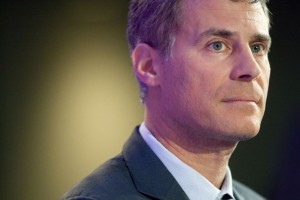The White House scrambled Monday to finalize a new jobs initiative as President Obama nominated the last member of the economic team that will be charged with carrying it out.
In tapping Alan Krueger, a Princeton University professor and noted labor expert, to be chairman of the Council of Economic Advisers, Obama turned to an economist who officials said was well suited to guide the White House through a jobs crisis.
奥巴马, standing with Krueger in the Rose Garden on Monday, said he intended to reveal the much-anticipated new jobs agenda in a speech next week.
That address, coming at the end of a summer of worsening economic news and sagging poll numbers for the president, is shaping up as a pivotal moment as Obama tries to resuscitate his presidency with less than 15 months before he stands for reelection.
然而,, behind the scenes Obama and top aides had yet to reach agreement on the major tenets of that plan, and it remained unclear whether the president was looking for narrower ideas with a realistic chance of passing the Republican-led House or more sweeping stimulus proposals that would excite his liberal base and draw contrasts with the GOP.
“Everyone’s trying to read the tea leaves to see what the president is going to put forward,” said Rep. 克里斯·范·浩伦 (马里兰州。), the senior Democrat on the House Budget Committee.
Obama offered few hints Monday.
“I will be laying out a series of steps that Congress can take immediately to put more money in the pockets of working families and middle-class families, to make it easier for small businesses to hire people, to put construction crews to work rebuilding our nation’s roads and railways and airports, and all the other measures that can help to grow this economy,“他说.
Obama said the plan would consist of “bipartisan ideas that ought to be the kind of proposals that everybody can get behind, no matter what your political affiliation might be.”
According to administration officials and others familiar with the matter, Obama is considering a tax cut that would directly reward companies for hiring new workers, new spending for environmentally friendly construction and for rehabilitating schools, and clean-energy tax cuts.
He is also developing programs to target long-term unemployment, potentially including a version of a Georgia unemployment insurance program that pays employers to hire workers who have been unemployed and provides funding for training.
同时, Obama may announce new programs to lift the housing market, such as a refinancing initiative that could pump tens of billions of dollars into the economy.
Obama also is likely to renew calls for renewing — and potentially expanding — ongoing efforts, such as a two-percentage-point cut in the payroll tax.
It was not clear Monday whether Obama intended his plan to be enacted as separate legislation or serve as recommendations to be taken up by a new, bipartisan committee of lawmakers that was set up this summer to map out a strategy for reducing the federal deficit.
The challenge for Obama is winning passage for anything that looks like additional government spending. House Republicans, who say the administration’s 2009 economic stimulus program was a failure, have vowed to block measures that add to the national debt.
“If it’s crafted correctly and fought for, it could clear a pretty high political bar,” said Jared Bernstein, former economics adviser to Vice President Biden.
The renewed focus on jobs reflects a shift for Obama and his economic team, who have devoted much of their attention over the past year to the debate over how to cut the budget deficit. That objective was pushed to the forefront by tea party Republicans who prevailed in the midterm congressional elections in November. Some White House aides calculated that Obama, by embracing deficit reduction, could curry favor with the independent voters he needs to win reelection.
But as Obama negotiated a deficit-reduction part of the debt-ceiling debate this summer, surveys showed a dramatic fall in voters’ approval of his job performance. The dip began in July as debt talks heated up, and recent polls show his job approval rating in the low 40s.
与此同时, an array of mixed economic signals — including breathtaking losses and gains on the stock market in recent weeks — have left many Americans unsettled. The roller-coaster ride continued Monday as a sudden burst of optimism regarding the global economy sent U.S. stocks sharply higher.
Surveys show Americans to be most concerned about jobs. Several economists and officials said Monday that Krueger, if confirmed, could help in that area.
“It’s clear to everybody on the planet that there isn’t going to be another $787 billion stimulus package,” said Alan Blinder, a fellow Princeton economist. “You’re going to have to design something micro targeted and much less costly in the budgetary dollars. These are the kinds of things that labor economists, and Alan Krueger in particular, have a lot of insight on.”
Krueger has done leading research on why a minimum wage does not increase joblessness and why job growth can lag during otherwise prosperous economic time. He served as chief economist in the Treasury Department from March 2009 until November 2010 but returned to Princeton, where he’s been a professor since 1987, in order to preserve his tenure.
During his time at Treasury, Krueger advocates a number of key administration measures designed to stimulate the economy, including a tax cut for businesses that hire new workers, the “cash for clunkers” auto trade-in program, and “Build America Bonds” that allowed states and localities to raise funds for building roads and other construction projects.
Outside of labor economics, he has researched an eclectic range of subjects, including music and terrorism. In one study, he found that many terrorists hailed from middle class backgrounds, not the impoverished conditions many assumed.
Krueger replaces Austan Goolsbee, who had been a confidant of Obama since his 2004 Senate run and had served as chairman of the Council of Economic Advisers since last fall. Goolsbee was successor to Christina Romer, a macroeconomist who was an advocate for aggressive new federal spending to fuel the economic recovery.
Unlike Romer, who grew frustrated with the administration’s unwillingness to pursue major new jobs initiatives, Krueger is unlikely to be a voice of dissent.
Krueger is a center-left economist in the mold of many top economic policymakers in the Obama administration, including Goolsbee and Harvard economist Lawrence Summers, the Harvard economist who resigned as director of the National Economic Council at the start of the year.
ñ. Gregory Mankiw, the Harvard economist who led President George W. Bush’s Council of Economic Advisers, said Krueger was unlikely to push the White House in any new directions.
“He’s a very smart guy, and it’s always good when smart guys get important jobs,” Mankiw said. “But he has been a part of the administration, so it’s not a signal that they’re going to change things. It’s a signal of continuity, if anything.”
Obama’s nomination of Krueger would largely reconstitute the economic policy team inside the Treasury Department during the first two years of the administration. At the time, Krueger served as Treasury Secretary Timothy F. Geithner’s top economic adviser. His work overlapped with that of Gene Sperling, who was a top adviser on budget and tax issues. Should Krueger be confirmed by the Senate, he will rejoin Sperling at the White House, where he is director of the National Economic Council.
Krueger was previously confirmed by the Senate and, as a result, may have an easier time being confirmed for his new job.
来源: 华盛顿邮报



没有评论
提出的意见 普林斯顿大学经济学家挖头的经济顾问委员会 目前已经结束.